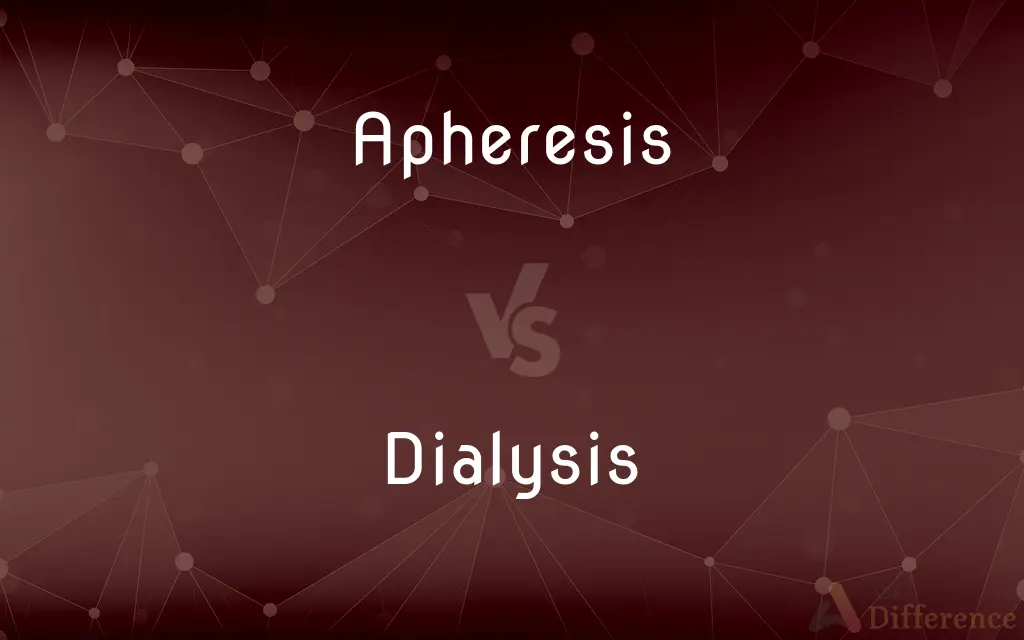Apheresis vs. Dialysis — What's the Difference?

Difference Between Apheresis and Dialysis
ADVERTISEMENT
Compare with Definitions
Apheresis
Apheresis (ἀφαίρεσις (aphairesis, "a taking away")) is a medical technology in which the blood of a person is passed through an apparatus that separates out one particular constituent and returns the remainder to the circulation. It is thus an extracorporeal therapy.
Dialysis
In medicine, dialysis is the process of removing excess water, solutes, and toxins from the blood in people whose kidneys can no longer perform these functions naturally. This is referred to as renal replacement therapy.
Apheresis
(Linguistics) Variant of aphaeresis.
Dialysis
The separation of smaller molecules from larger molecules or of dissolved substances from colloidal particles in a solution by selective diffusion through a semipermeable membrane.
Apheresis
Aph·e·re·sis (ăf′ə-rēsĭs) Medicine A procedure in which blood is drawn from a donor and separated into its components, some of which are retained, such as plasma or platelets, and the remainder returned by transfusion to the donor. Also called hemapheresis.
ADVERTISEMENT
Dialysis
(Medicine) Any of several techniques, especially hemodialysis and peritoneal dialysis, in which filtration through a semipermeable membrane is used to remove metabolic wastes and excess fluid from the blood of people with kidney failure.
Apheresis
Elision, suppression, or complete loss of a letter or sound (syllable) from the beginning of a word, such as the development of special from especial; procope.
Dialysis
(chemistry) A method of separating molecules or particles of different sizes by differential diffusion through a semipermeable membrane.
Apheresis
The removal of blood from a patient, and the removal of certain components (such as platelets) from that blood, followed by the transfusion of the filtered blood back to the donor (patient).
Dialysis
(medicine) Utilization of this method for removal of waste products from the blood in the case of kidney failure: hemodialysis or peritoneal dialysis.
Artificial kidney
Apheresis
Extirpation or extraction of a superfluity (especially a pathological one) from the body, especially blood.
Dialysis
(rhetoric) The spelling out of alternatives, or presenting of either-or arguments that lead to a conclusion.
Apheresis
The dropping of a letter or syllable from the beginning of a word; e. g., cute for acute.
Dialysis
(rhetoric) Asyndeton.
Apheresis
An operation by which any part is separated from the rest.
Dialysis
Diæresis. See Diæresis, 1.
Apheresis
(linguistics) omission at the beginning of a word as in `coon' for `raccoon' or `till' for `until'
Dialysis
Same as Asyndeton.
Apheresis
A procedure in which blood is drawn and separated into its components by dialysis; some are retained and the rest are returned to the donor by transfusion
Dialysis
Debility.
Dialysis
The separation of different substances in solution, as crystalloids and colloids, by means of their unequal diffusion, especially through natural or artificial membranes.
Dialysis
Separation of substances in solution by means of their unequal diffusion through semipermeable membranes
Share Your Discovery

Previous Comparison
Flush vs. Plush
Next Comparison
Brochure vs. Poster














































